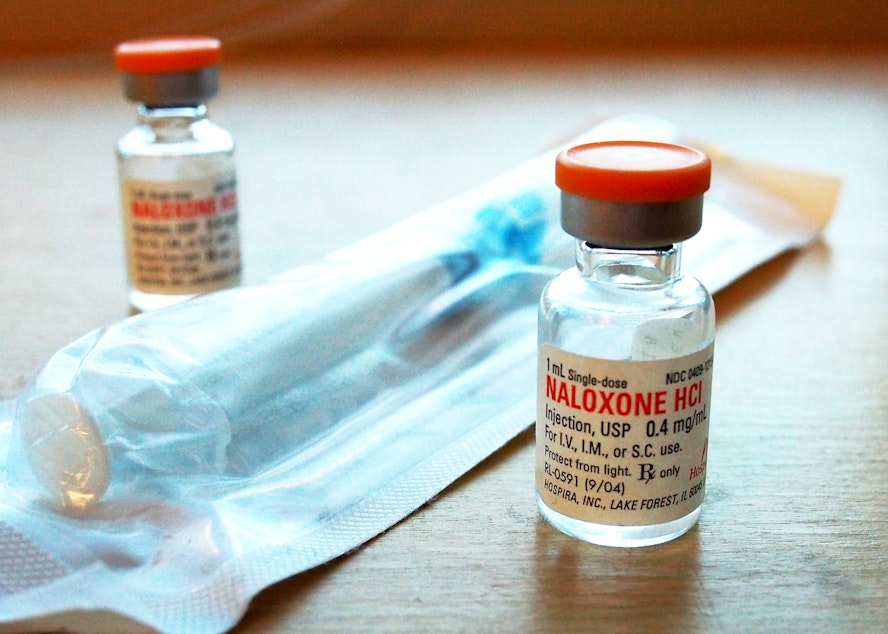Drug overdose deaths increased by more than 30% in WA amid pandemic

According to preliminary data from the Washington State Department of Health, 1,649 people lost their lives to drug overdoses here last year. It was an increase of more than 30% compared to the year before. It is by far the biggest year-over-year increase during the last decade, and it is almost certainly being driven by the pandemic.
Caleb Banta-Green is a research scientist with the University of Washington's Addictions, Drug & Alcohol Institute. He helped KUOW’s Kim Malcolm put those numbers into context.
This interview has been edited for clarity.
Kim Malcolm: That is a startling figure, a 30% increase in deaths. When you first saw those numbers, what did you think?
Caleb Banta-Green: First, that it's devastating. And second, that it's not a surprise. We know the majority of people who are using substances or have substance use disorder are not able to access high-quality services when they need them. That's generally the case.
All of the restrictions of the last year-plus have just exacerbated that and made the situation worse in terms of why people are using, and what they're using, and really impacting their ability to engage in harm reduction and other services.
When people are alone during this pandemic — are isolated — does that mean they're more likely to die?
Absolutely. The issue with many overdoses is that the time between when a person starts having an overdose and actually dies can be minutes or hours. If they're alone, there's no one around to see them, and provide help, or get help. I think one of the reasons we're seeing a higher rate of fatal overdoses is because more often people are alone.
Are there any drugs in particular that are driving this increase in deaths?
The piece that's really driving it is fentanyl-involved deaths. Fentanyl is a synthetic opioid. Most people may have heard of it, or in fact, had it at a hospital for surgery. But illicitly-manufactured fentanyl is almost all of the market out there on the street, or the internet at this point.
Fentanyl is a very potent, very fast-acting opioid. Those are bad things for a drug both in terms of overdose risk, but also in terms of addiction potential. That really has been driving most of this increase.
There are more people getting vaccinated now. The economy is showing some signs of rebounding. As we recover from this pandemic, and people get more connected again, is it possible that fatal overdoses could start to go down?
I would hope so, as we get some degree of more normalcy and more stability — that there would be less stress on folks. We do need to think about when these stimulus checks run out, when these eviction moratoria run out, what impact is that going to have? I actually think those could have created a bit of a buffer, in terms of being a bit protective for folks, not feeling at least that financial and housing stress.
On the one hand, yes, we're coming out of Covid. On the other hand, some of the financial supports that were in place because of Covid are going to be drying up, and that could continue to really create additional stresses on people.
You're seeing a potential for more deaths in the future without more supports being in place?
Yes, I think that something like that could happen. There could be a bit of either a continuation or a rebound. This is such a chaotic time. I've never seen a substance like fentanyl in my 25 years of work, something that is so potent, that is so cheap, with such potential for addiction and overdose, then combined with the financial and social upheaval we've seen over the last year-plus.
Big picture, as we come out of this pandemic, what are the solutions that we should be embracing now?
I think about people's lives and the decisions they have to make on a daily basis, all of us, in our life. There are things that we all need to do. We're more likely to do them if they are easier to do — if they are convenient. If you think about convenience, you generally don't think about the health care system.
We've been working with a lot of innovative products around the state, and where we've seen extreme excitement and success and uptake is in low-barrier or no-barrier access to services in community settings, providing people the services they want when and where they want them. That might include mental health, physical health, substance use disorder, harm reduction services like syringe exchanges, and Naloxone to keep people alive. We're trying to bring all of these things together.
We also need to recognize that the reasons people use substances are complex and that drugs are a symptom or a consequence of really complex, challenging, chaotic, traumatized lives. We need to be engaging with people, first and foremost.
Our main goal is to engage with people over a long period of time. We want to offer this diverse, meaningful, helpful service mix. That sounds complex, but it really isn't. It's really asking people, what do you need now? What do you need next? And making that easy for them to access.
Listen to the interview by clicking the play button above.


